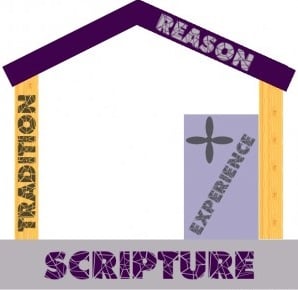We’re discussing how we build our knowledge of God, our theology, and using Wesley’s Quadrilateral (Scripture, Tradition, Reason and Experience) as an outline for our discussion. Again, this whole topic was spurred by the argument made by Al Mohler and others that theism, the idea that God is active in the world, is at stake in the age of earth debates; this is an argument I strongly question, especially as I form my belief in theism from Scripture, Tradition, Reason and Experience. Again, I’m somewhat undecided on many issues concerning origins, but I am not undecided on theism, and my experience of God is a big part of that.
Here is the introduction to the role of “Experience” from the website of the United Methodist Church, which I’d like to follow with a personal story.
“A third source and criterion of our theology is our experience. By experience we mean especially the “new life in Christ,” which is ours as a gift of God’s grace; such rebirth and personal assurance gives us new eyes to see the living truth in Scripture. But we mean also the broader experience of all the life we live, its joys, its hurts, its yearnings. So we interpret the Bible in light of our cumulative experiences. We interpret our life’s experience in light of the biblical message. We do so not only for our experience individually but also for the experience of the whole human family.”
I
mentioned the initial “spur” for these discussions because nowhere
should our experience be more relevant than in forming our belief that God is
active today in the world. The
bible can and does promise God’s present activity; it even gives a multitude of
examples we could look for today; and Tradition is full of the same kinds of
things, but it is through Experience that I personally become a witness of
Christ and of God, and not merely a person who hears the testimony of
others. I’m not saying that my own
belief in theism isn’t also supported by Scripture, Tradition and Reason. What I am saying is that I am not
personally a theist because of those alone. The first reasons I would give to others for my belief in
God’s present activity are the things I’ve personally seen God do, not my
understanding of origins or a host of other biblical narratives.
“Witnessing”
was very important in my corner of Christianity growing up. One might think (and even hear) from
the churches I grew up in that “witnessing” was the reason Christians weren’t already in heaven. In the same vein, it was critical that
one knew his or her testimony. One of the ironies I discovered over
the years was that we were actually using the term “witnessing”
incorrectly and being unjustifiably narrow in our concept of our
“testimony.” You see,
what we meant by “witnessing” was telling non-Christians about the
gospel, which is no doubt good.
But that’s not actually “witnessing.” “Witnessing” is prior to
that. Witnessing, whether in legal
or biblical usage, is personally
observing something or someone.
In this case, it was assumed that we had actually seen God do something. And what we meant by
“testimony” was almost always limited to our conversion. The implication was that our conversion
was the only thing any of us ever really saw God do, or at least the only thing
that mattered.
But
was conversion the only thing the original “witnesses” of Christ saw
him do? Was their own conversion
their only “testimony” about him? Is it the only observable thing that the Spirit of God and
Christ does today?
The
churches of my youth would often say that the lack of “witnessing”
was the biggest failure of the Church today. I actually agree with them, but I feel like Inigo Montoya in
my agreement. In the Church in
the West, we need to seriously consider the following question: Is God still making witnesses of Christ today as a/the central missional strategy? If we answer in the affirmative, then
we’ve just started to realize the critical role that experience must play not
only in our own theology but in the knowledge of God we attempt to give to
others as his witnesses. From there the question needs to become
more personal: What have I witnessed the
living God do? What is my testimony? What is the significance of what I’ve observed? How does it rightfully shape what I do
and what I think about God?
And it needs to become communal, too: How can we as
churches facilitate our people becoming Christ’s witnesses? How can we train people to observe God
work, whether through them or others or otherwise and the skills to remember
and relay what they’ve seen in harmony with Scripture, Tradition and Reason? How can we better embrace and
facilitate our vocation to be the witnesses of Christ?
Revelation
says that believers overcame Satan by the power of their testimony and the
blood of the Lamb. Personally, I
am totally convinced that this testimony contains far more than just our
observations of Christ in conversion. Rather, it is everything we’ve seen God do from conversion forward and sometimes
even pre-conversion. The fact that
such experience is placed next to the blood of the Lamb as one of two things
through which believers overcome Satan should give us all serious pause about
dismissing the importance of experience with God. Our victory over the powers of darkness seems to be at stake
at least in part because of our experience. Do you see God’s
intention as being both/and regarding embracing his past acts and his present
acts with us (the testimony of scripture, of tradition and our own current
experience)? Or do you or your
camp see it, more or less, as either/or for one of the Quads?


